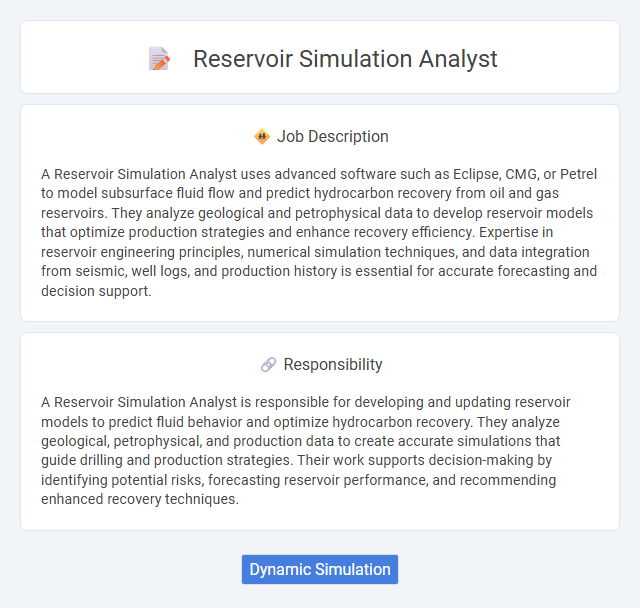
A Reservoir Simulation Analyst uses advanced software such as Eclipse, CMG, or Petrel to model subsurface fluid flow and predict hydrocarbon recovery from oil and gas reservoirs. They analyze geological and petrophysical data to develop reservoir models that optimize production strategies and enhance recovery efficiency. Expertise in reservoir engineering principles, numerical simulation techniques, and data integration from seismic, well logs, and production history is essential for accurate forecasting and decision support.
Individuals with strong analytical skills and a background in engineering or geosciences will likely be well-suited for a Reservoir Simulation Analyst role, as the job demands detailed data interpretation and problem-solving abilities. Those who are comfortable working with complex software models and have patience for iterative testing may find the work engaging and rewarding. Conversely, people who prefer highly social environments or dislike extensive computer-based tasks might experience challenges adapting to the technical and solitary aspects of this position.
Qualification
A Reservoir Simulation Analyst must possess a strong foundation in petroleum engineering, geosciences, or applied mathematics, often supported by a bachelor's or master's degree. Proficiency in reservoir simulation software such as Eclipse, CMG, or Petrel RE is essential, along with expertise in numerical modeling, data integration, and production forecasting. Advanced skills in scripting languages like Python or MATLAB to automate workflows and analyze large data sets enhance the ability to optimize reservoir performance and support decision-making processes.
Responsibility
A Reservoir Simulation Analyst is responsible for developing and updating reservoir models to predict fluid behavior and optimize hydrocarbon recovery. They analyze geological, petrophysical, and production data to create accurate simulations that guide drilling and production strategies. Their work supports decision-making by identifying potential risks, forecasting reservoir performance, and recommending enhanced recovery techniques.
Benefit
The Reservoir simulation analyst role likely offers benefits such as enhanced understanding of subsurface characteristics and improved decision-making for hydrocarbon recovery. Professionals in this position probably gain access to advanced simulation software and data analysis tools, which boosts technical skills and career growth opportunities. There is a strong possibility that the job includes collaboration with multidisciplinary teams, fostering professional networking and industry insight.
Challenge
Reservoir simulation analysts likely face challenges in accurately modeling complex subsurface formations and fluid behaviors due to uncertain geological data and dynamic reservoir conditions. They probably encounter difficulties in integrating multidisciplinary data sets to optimize oil and gas recovery while managing computational limitations. The role may require constant adaptation to evolving technology and simulation software to enhance prediction reliability and decision-making.
Career Advancement
Reservoir simulation analysts develop advanced models to predict fluid flow and optimize hydrocarbon recovery, leveraging expertise in software like Eclipse and Petrel. Mastery in reservoir characterization and enhanced oil recovery techniques can lead to roles such as senior reservoir engineer or asset manager. Continuous skill enhancement in machine learning applications and data analytics within reservoir simulation drives career progression and higher industry impact.
Key Terms
Dynamic Simulation
A Reservoir Simulation Analyst specializing in Dynamic Simulation develops and calibrates complex numerical models to predict fluid flow and reservoir performance under various production scenarios. They utilize advanced software tools such as ECLIPSE, CMG, and Petrel to analyze pressure, saturation, and temperature changes over time, optimizing recovery strategies and forecasting production rates. Their expertise in dynamic reservoir behavior directly supports decision-making processes for enhanced oil recovery and reservoir management.
 kuljobs.com
kuljobs.com